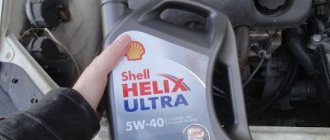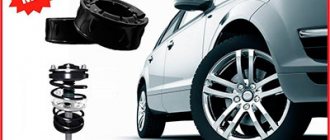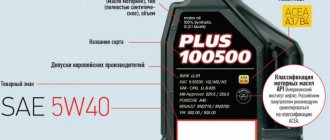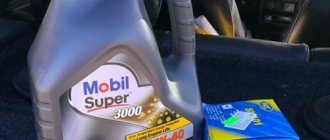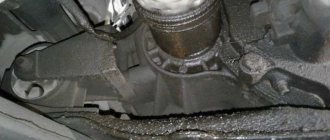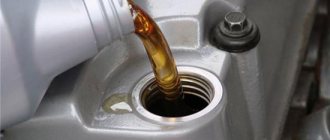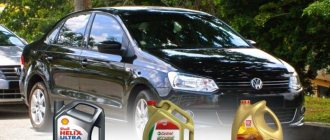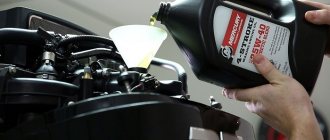Any consumable intended for a vehicle - diesel or gasoline motor oil - must provide a high level of protection of all rubbing elements from wear, overheating and deformation. An insufficiently high-quality mixture can damage the engine compartment and lead to serious, costly repairs. In order to prevent catastrophic consequences and increase the useful life of the car, you need to be able to select the right technical fluids.
Let’s figure out what kind of oils exist for diesel engines and why you can’t pour “gasoline” lubricant into such an engine.
Differences between diesel oil and gasoline
Diesel engine oil runs on a lean fuel-air mixture under severe conditions. The fuel mixes with air and burns at an accelerated rate, resulting in higher loads and increased emissions of carbon dioxide, soot, sulfur and other hazardous substances.
Combustion products enter the crankcase for subsequent processing using the crankcase ventilation system. But this system does not always cope with a large volume of impurities, which is one of the reasons for the accelerated oxidation of the internal surfaces of the internal combustion engine. In this regard, high-quality diesel oil, compared to gasoline lubricants, as a rule, should have more effective cleaning properties and increased resistance to oxidation processes.
Gasoline and diesel oils have the same base, but a specific additive package. There are many more of them in diesel oil in order to obtain a highly effective basis for protection against deposits and colossal loads. We are talking about special detergent additives used only in diesel lubricants. The purpose of these additives is to remove from the working area that volume of oil and soot that the crankcase ventilation system did not have time to process.
Composition of oil for turbocharged internal combustion engines - mineral or synthetic?
There is no critical difference between choosing mineral water or synthetics. In addition, turbodiesels appeared long before the advent of synthetic base. And all early diesel turbo units worked perfectly on mineral oil.
On the other hand, synthetic oils are much more stable. What does this mean? As a rule, any oil loses its specified properties and characteristics over time. With synthetics, quality deterioration occurs quickly, but after the replacement period has expired. And mineral oil slowly degrades from the first day of use.
This means that in the middle of the replacement interval, the performance of mineral water will be significantly lower than that of synthetics.
For a turbodiesel, such a spread is undesirable, so it is better to overpay a little and buy at least semi-synthetics.
Choosing an oil base for a turbodiesel
All lubricants are divided into three categories:
- mineral
- semi-synthetic
- synthetic
Mineral oil
Mineral oil consists only of natural ingredients with a minimum set of additives. It is important to note that at first the effectiveness of such a lubricant will not be much different from the more expensive lubricants discussed below. However, over time, the situation will change not in favor of cheap mineral water, which has a shorter replacement interval. Since mineral water is made from processed oil and has only natural ingredients, this type of oil can quickly lose its beneficial properties under temperature changes and any other high loads. Therefore, it makes sense to use mineral water in modern realities only if it is provided for in the vehicle’s service book. The replacement period for such oil usually does not exceed 5 thousand km.
Semi-synthetic oil
Semi-synthetic oil is more relevant for used diesel turbo engines, even despite the presence of a mineral base and partially artificially created components in its composition. The effectiveness of semi-synthetics in comparison with mineral water is due to synthetic additives, thanks to which such oil better protects the engine from overheating, contamination by soot and combustion products. The replacement period for semi-synthetics in diesel turbo engines is 7 thousand km.
Synthetic oil
Synthetic oil should be used in modern turbodiesels with minimal mileage. Synthetics contain unnatural components that have a high degree of impact on engine parts. This helps to increase its power, reduce fuel consumption and improve environmental performance. High-quality synthetics are also characterized by long-term resistance to oxidative and corrosive processes, as well as the maximum degree of cleaning of rubbing mechanisms from dirt deposits. The timing for changing synthetic oil in diesel turbo engines ranges from 10 thousand km.
Bottom line
It is impossible to say unequivocally which diesel engine oil is best to fill, because each car has its own unique requirements. Vehicle manufacturers empirically calculate the oils that are most suitable for certain power plants, which is why you should listen to their recommendations. If for some reason you do not have a service book for your car, you should not consult salespeople in stores - their knowledge may be limited only to information from the Internet. In order to calculate the required viscosity and consumer properties of diesel oil, just call the official representatives of the automaker and check with them for information.
Choosing oil viscosity for turbodiesel
As a rule, all-season and universal motor oils for diesel and gasoline engines with turbines are in greatest demand among owners of diesel cars. Such lubricants are equally well suited for different climatic and road loads at any time of the year. On the other hand, some car enthusiasts still prefer certain types of oils that are designed specifically for diesel engines. Some companies still specialize in such oils.
In fact, the viscosity of the oil, as determined by the SAE standard, is much more important. It must be selected depending on climatic conditions and the age of the car. Practice shows that owners of older cars switch to a more viscous oil than specified in the factory documentation. This means that for cars with low mileage, you should use only the viscosity recommended by the manufacturer.
The most popular is the all-season viscosity 5W-40, using the example of which we will consider the temperature indicators for optimal operation of a diesel engine with such oil.
So, 5W-40 diesel lubricant is capable of effectively lubricating and washing the engine at temperatures down to minus 35 degrees. As for high-temperature viscosity, in this case such oil can withstand temperatures up to plus 40 degrees.
How to choose
The Guide also contains a variety of useful recommendations. For example: “It is not recommended to mix motor oils of the same type if they are of different brands. The use of oils of the same type and brand, but with different viscosities, is allowed only as a last resort.” Or: “For efficient and long-term engine operation, it is recommended to use oils of the same brand, type and viscosity. It is better to write down this data when changing the oil.” And so on.
Accordingly, in the “Manual” printed before 2005, there should be no information about “Low SAPS” oils that appeared later.
(the manufacturer simply could not recommend something that did not already exist). In this situation, when choosing engine oil for an engine with a particulate filter, you can use the above information (ACEA classification with “C” classes).
Conclusion
When choosing a product, it is recommended not to complicate the process by studying large volumes of information and recommendations from “experienced and experienced” drivers, whose advice sometimes turns out to be not only useless, but also harmful. Everything here has already been chosen before us and for us by manufacturers, developers and designers.
The modern level of automotive industry is so high that it is unlikely that even the most experienced drivers with many years of experience know more than specialist manufacturers, developers and laboratory testers. All that is required from the driver when choosing engine oil is to find and use the manufacturer’s existing recommendations.
Video about the consequences of removing the particulate filter:
Source
Characteristics of diesel oils
SAE standard
As mentioned above, SAE determines the viscosity of an oil. For diesel lubricant, the preferred viscosity is 5W-30, 5W-40, 10W-30 or 10W-40. By the presence of the letter W (Winter), it is immediately clear that these are all-season oils, suitable also for winter use. To the left of it is the low-temperature viscosity, and to the right is the high-temperature viscosity. Let's consider the permissible operating temperatures of oils with different types of viscosity, most suitable for diesel turbo engines:
- 5W – up to minus 25 degrees.
- 10W – up to minus 20 degrees.
- 15W – up to minus 15 degrees.
API standard
API is an American classification that divides oils according to their performance properties. There are two categories here - S (for gasoline engines) and C (for diesel engines). The API value depends on the condition of the engine and the year of manufacture of the car - the higher the letter in the alphabet, the higher the quality of the oil. For diesel engines, the following API abbreviations are provided:
- CF, CF-4
- CH, CH-4
- CI, CI-4
- CJ, CJ-4
What is the required API for universal oil?
When choosing a universal oil for diesel turbo engines, you need to pay attention to the API CF/SJ marking. The main thing here is not to get confused, since, for example, universal oil labeled SJ/CF is more suitable for gasoline engines.
ACEA standard
- ACEA is a European classification, which is divided into two categories:
- A/B – for gasoline engines and light diesel engines (A1/B1, A3/B3, A3/B4, A5/B5)
- C – for gasoline engines and light diesel engines with catalysts (C1-C4)
- E – for powerful diesel engines subject to high loads (E4/E9)
Filter structure
Manufacturers of gasoline engines use catalytic converters, but diesel has a special structure, and during its operation, complete combustion of fuel often does not occur, which is why a significant amount of harmful substances, including soot, are released into the atmosphere. To reduce the concentration of emissions of these substances, manufacturers of heavy fuel engines also use particulate filters. The function of which is reduced to cleaning the exhaust from soot particles.
Operation of diesel vehicles with a particulate filter requires a special operating mode. It consists in the need to regularly regenerate the particulate filter, strictly adhere to the oil change schedule and be careful about its choice. Ignoring the indicated points will inevitably lead to expensive repairs. When the filter is clogged, the following problematic issues arise in the operation of the car:
The best diesel oil for turbodiesel. Our choice
Castrol Magnatec Professional 10W-40 A3
156EBB – 600 RUR per 1 liter
Characteristics:
- Type – semi-synthetic
- Viscosity SAE – 10W-40
- API approval – SN
- ACEA approval – A3/B3, A3/B4
- Purpose – gasoline, diesel
- Viscosity index – 155
- Kinematic viscosity at 40/100 g. – 93.14/14.09
- Density at 15 g. – 0.8605
- Pour/flash point – minus 37/200.5 degrees.
Castrol Magnatec Professional 10W-40 A3 oil has a high-quality semi-synthetic base, which is balanced in its all-season parameters, close to more expensive synthetics. Despite its low cost, this lubricant is characterized by optimal washing and lubricating properties, stable pumping in cold and warm weather, as well as high engine efficiency and environmental friendliness.
Lubricant quality
Oh, how I want to fill up with full-fledged synthetic diesel! The choice is great. But! For diesel engines starting from EURO 5, equipped with particulate filters (FAP), oils with low ash content are required. Otherwise, the filter will accumulate excess non-combustible ash from additives and will quickly fail. Therefore, I comply with the requirements of PSA B7122290
, filling in Ravenol FEL 5W-30.
Oil with PSA B7122290 (C2) approval has a low ash content of 0.58. Which is good for FAP.
Champion XE529 oil cartridge. 4.5 USD
Made carefully. And it's not expensive.
The factory steel protection has a cutout for draining waste. Thank you, very useful thing.
But how long do such oils “live” while maintaining their protective properties? And what if with our fuel? Obviously not for long. Let's look at the parameters important for diesel oils: Sulfated ash content
(an indicator of the presence of additives in the oil) this compromise oil has only 0.58%. For specialized products for diesel engines, this figure is 1% or higher. For cargo trucks it can even reach 1.75%. Base number
- this is an indicator of the oil’s ability to withstand acids in sulfur-containing fuel, and also characterizes its cleaning properties. It is also relatively small - 6.7 mg KOH/g. For diesels it is better when it is 9 and above. Interestingly, this is typical for all “low ash tanks” C2 and C3, which are categorically recommended by manufacturers of diesel equipment EURO5 and higher. To preserve particulate filters.
extra virgin olive oil
Well, you will have to change the oil more often.
We must protect the environment - no one argues. For this reason, we, the owners of modern diesel cars: EURO4
— we pay for recirculation systems and catalysts, constantly clean and change EGR valves, sort out and wash intake manifolds, repair cylinder heads corroded by acids. EURO5
– we pay very high prices for particulate filters and cerium-containing additives EOLYS. And also for their injection systems. With constant urban use, we are forced to go onto the highway to ensure that the soot is burned. We buy low-ash oils, which are often more expensive and less effective for the engine itself.
The EOLYS injection system is covered with protection - the bitter experience of breaking out the reservoir on uneven surfaces is taken into account.
– we give our money to the creators of the AdBlue urea injection system. And then we regularly buy the supplement itself. At the same time, engines “strangled” by environmental regulations still run worse and do not run for a long time due to recirculation. Clean air is expensive. ***** This begs the question. States in the post-Soviet space do not support environmentally friendly new technology by reducing taxes. Just as the stinking ancient, but at the same time eternal, Ikarus-MAZ-Krazy-Kamaz trucks do not punish with a penny. It’s clear that for them this is question one hundred and sixteen. And for some reason I feel deceived.
Fuel system condition.
The service life of the particulate filter also depends on the condition of the fuel system - the worse the fuel system works, the worse the injectors spray, the more soot is formed during fuel combustion and the higher the load on the particulate filter.
Do not forget that “poor performance of the fuel system” always (!!!) begins with its (system) contamination: diesel fuel is a petroleum product that, like oil, forms varnish and resinous deposits that clog both the micronozzles of the injectors and the fuel rail, and fuel pressure regulator in the rail and... You can read about this in a separate article.
Therefore, do not neglect timely and regular maintenance of the fuel system.
Diesel particulate filter (DPF) for diesel engines
Current answers to questions about particulate filters in diesel engines: why you need to be careful when choosing a diesel engine oil with a particulate filter. Why does a high phosphorus content in oil destroy the device and subsequently require its replacement?
And also: installation and dismantling of the particulate filter: pros and cons, pros and cons of various technologies for cleaning diesel filters.
Sulfur oil nuances
If we come across phosphorus oil with a high phosphorus content, then it will be impossible to remove these deposits: phosphorus reacts with platinum, causing its degradation, and that’s all, so to speak: the particulate filter has been “poisoned”. In principle, it will work after washing, but will have a shortened interval between these washings, because there is little active platinum;
Each regeneration process will take more time and the regeneration process will not reach the state of an almost new filter; it will no longer be able to oxidize soot. It definitely won’t be able to oxidize sulfur deposits if we poison it with phosphorus. Again, if sulfur deposits have accumulated, they are also held by resins on soot particles in this improvised labyrinth. If we remove these binding resinous deposits, we can dissolve the carbon deposits, then everything else will be perfectly washed away in the opposite direction, with water, be it soot or sulfur deposits.
What is ZIK: a few words about production
This trademark belongs to SK Corporation, one of the two largest corporations in South Korea. The SK Lubricants company, part of the “giant,” has been producing oil and gas for several decades. In the mid-90s, the company’s specialists developed a synthetic base oil, which became the basis for creating a line of lubricants: motor and transmission oils, greases, etc.
The high-tech component Yubase (synthetic base oil) is manufactured using the latest developments, has a very high viscosity index VHVI, and is of recognized quality. All products from the ZIC 5W30 line of motor oils are produced on this basis. Therefore, no matter what type of lubricant you choose, you always get reliable engine protection and improved performance.
